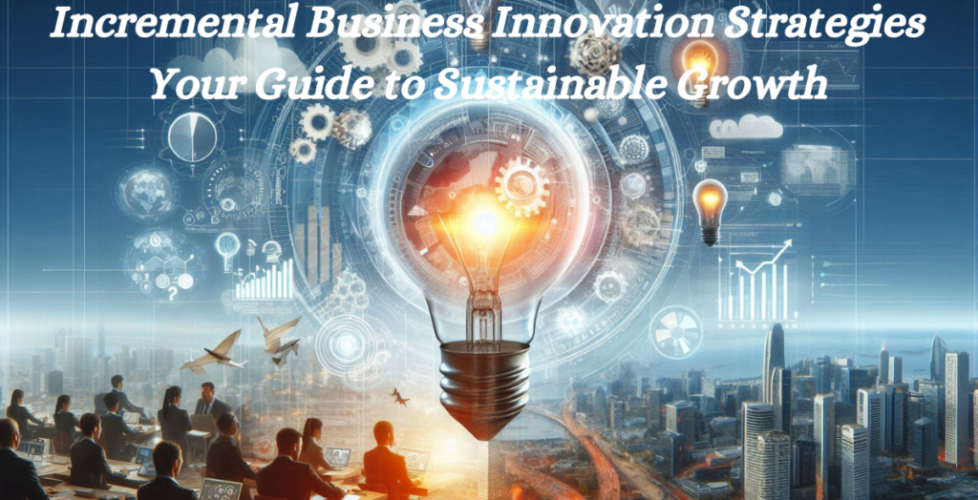Incremental Business Innovation Strategies: Your Guide to Sustainable Growth
In today’s dynamic business landscape, innovation has shifted from a luxury to a necessity for sustained success and expansion. Moreover, while radical innovations can trigger disruptive shifts, embracing more minor, iterative advancements often lays the groundwork for sustainable progress. Consequently, incremental business innovation strategies are characterized by continually implementing small-scale modifications to existing products, services, or processes. This approach provides a sturdy framework for businesses of all sizes, enabling them to stay ahead of the curve and foster long-term growth. According to the research, It aims to enhance functionality, increase efficiency, and improve the quality of offerings.
Key Strategies for Incremental Business Innovation

Core Functionalities:
The basis of incremental innovation lies in concentrating on the core functionalities of your offerings. By continuously enhancing important features and handling customer pain issues, businesses can make significant value for their users. Take Apple, for instance, whose iterative approach to iPhone growth has consistently resulted in user-centric progress and sustained market oversight.
Process Optimization:
Internal procedures can involve further product enhancements and incremental innovation. Executing lean manufacturing principles and mechanization, as pioneered by Toyota’s “Kaizen” system, can dramatically enhance efficiency, reduce waste, and increase productivity.
Customer Experience:
In today’s customer-centric globe, understanding and surpassing expectations is essential. Moreover, businesses like Amazon and Netflix have redefined client affairs by leveraging data-driven insights to personalize offerings and deliver targeted contact, fostering dedication and propelling growth.
Technology Adoption:
Remaining at the forefront of technology is essential for innovation. Consequently, as demonstrated by Adobe’s metamorphosis into cloud-based solutions, incorporating new tools and technologies into business operations can unlock new opportunities and drive efficiency gains.
Culture of Innovation:
A civilization that encourages creativity and investigation is a breeding environment for innovative ideas. Moreover, with its well-known “20% time” policy, institutions like Google have fostered conditions where employees are assigned to explore and develop new ideas. This approach leads to constant incremental innovations, sustaining a continuous improvement culture.
Read Also: Leveraging Innovative Business Solutions to Overcome Today’s Challenges
Case Studies:
Real-world examples showcase the power of incremental innovation across industries. McDonald’s has noticed a consistent sales boost through regular menu adjustments established based on customer feedback. Similarly, Gillette’s stringent refinement of razor design has kept its market superiority for decades.
Implementation Tips:
Implementing incremental innovation requires strategic planning. To begin with, start small, set attainable goals, and track improvement using data-driven techniques. Additionally, be flexible, continuously iterating based on market feedback and varying dynamics. Furthermore, fostering a culture of understanding and knowledge-sharing is essential to ensuring sustained innovation.
Challenges and Risks:

Incremental innovation isn’t without challenges. Dropping behind competitors, becoming arrogant, and managing possible troubles are risks to be assessed. Furthermore, Balancing incremental and extreme innovation is essential for long-term success.
Role of Data Analytics:
Data analytics plays a vital role in driving incremental innovation. By examining client data, market trends, and functional performance, businesses can identify possibilities for progress. Furthermore, they can follow the impact of their efforts and make data-driven conclusions.
The Role of Sustainability in Innovation
Sustainability is increasingly becoming a core element of innovation strategies. Implementing incremental, sustainable innovation not only helps mitigate environmental impact but also facilitates the development of more effective business models and market segments. Embracing sustainability has the potential to yield significant patents and reduce share price volatility, thereby fostering strategic growth.
Case Studies of Small Businesses and Startups:
Dollar Shave Club: This startup disrupted the razor industry by directly delivering high-quality, cheap razors to clients through a subscription sample, leveraging data to personalize offerings and optimize pricing.
Canva: This online design platform enables users to create professional-looking illustrations without requiring design expertise. Additionally, data research assists them in understanding user needs and preferences, consequently fostering continuous progress and the integration of new components.
Measuring the Impact of Incremental Innovation:
Tracking key metrics such as client satisfaction, sales development, efficiency gains, and production on asset (ROI) is critical to assessing the significance of incremental innovation efforts. Regularly checking and adjusting strategies founded on data insights provides continuous advancement and long-term conquest.
Ethical Considerations:
As businesses leverage data to drive innovation, it’s crucial to ensure responsible data collection, usage, and privacy practices. Moreover, key ethical considerations include ensuring transparency, obtaining informed consent, and protecting user data.
Impact of Artificial Intelligence (AI):
AI tools can examine data, automate operations, and develop creative ideas, presenting new possibilities for incremental innovation. Moreover, businesses can leverage AI to recognize patterns, anticipate customer behaviour, and create personalized offers, leading to more practical innovation actions.
Final Thoughts:
Incremental innovation is essential for businesses aiming for sustainable growth and competitiveness. When executed effectively, incremental innovation can be a robust tool for reaching sustainable business growth. Companies can continuously enhance by concentrating on core functionalities, optimizing procedures, prioritizing client experience, adopting technology, promoting a culture of innovation, and leveraging data-driven wisdom. Additionally, by embracing incremental innovation, businesses can unlock a path to ongoing success. Embark on your incremental innovation journey today and pave the way for sustained growth and competitiveness.
